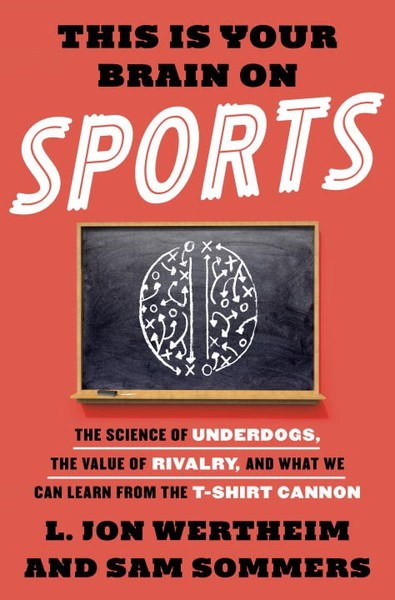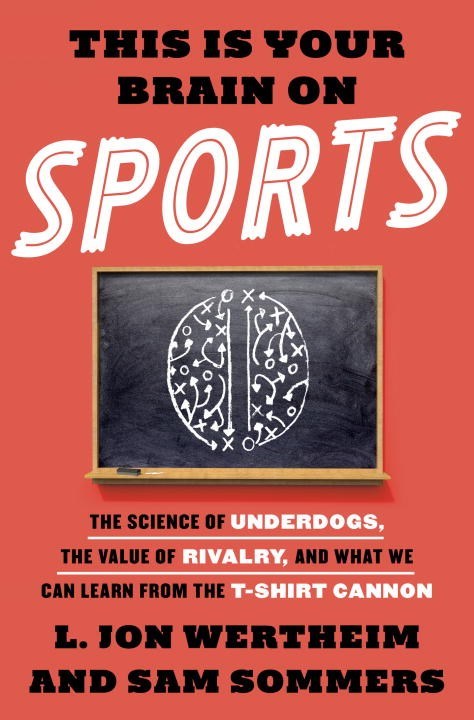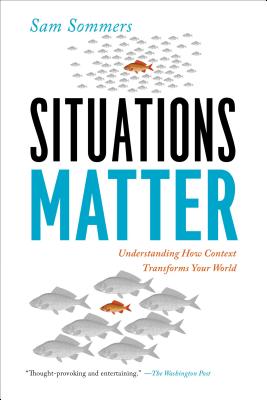This is Your Brain on Sports: The Science of Underdogs, the Value of Rivalry, and What We Can Learn from the T-Shirt Cannon
February 11, 2016
Jon Wertheim and Sam Sommers have written a speedy compendium of sports stories and human behavioral tendencies that serves up social science insight with agility and good humor.
 (Warning: this is a fan letter masquerading as a book review; or a book review masquerading as a fan letter. Your choice. I am going to tell you about the new book, This is Your Brain on Sports, but I'm less a sports fan than I am a fan of one of the co-authors, Jon Wertheim. Despite this admission, keep reading, please, because this book is really good.)
(Warning: this is a fan letter masquerading as a book review; or a book review masquerading as a fan letter. Your choice. I am going to tell you about the new book, This is Your Brain on Sports, but I'm less a sports fan than I am a fan of one of the co-authors, Jon Wertheim. Despite this admission, keep reading, please, because this book is really good.)
In Amy Schumer’s 2015 bawdy but tender-hearted comedy, Trainwreck, one of the running themes is that her character, a men’s magazine writer, is completely disinterested and dismissive of sports.
I don’t know why we treat these athletes like heroes just ‘cause they can skate fast or kick a ball in a net. I just think it’s weird. No offense. I just think that sports are stupid and anyone who likes them is just a lesser person.
In the movie’s meet cute, she is given an assignment to write a personal interest story on a sports injury surgeon who treats some of the biggest names in professional sports. During her interviews, she is exposed to his more generous interpretation of sports as central to happiness and community building, and, of course, falls for him in all his sports-nerd glory. She might, if the ending of the movie is interpreted this way, have come to appreciate sports, a little bit.
While this is not a wholly intriguing plot on its own (the characters are really what make the movie so entertaining), the deeper takeaway is this: even if you think you are one kind of person, sometimes, when you let another person in, you can actually expand your world. In this particular case, Amy allows her new boyfriend to convince her that sport is something that has value, and it is that denouement that leads us to a review of This is Your Brain on Sports: The Science of Underdogs, the Value of Rivalry, and What We Can Learn from the T-Shirt Cannon by L. Jon Wertheim and Sam Sommers.
In a book that Wertheim himself describes as fitting into “the Freakonomics-for-sports genre,” the authors introduce readers to an amalgamation of facets of sport—fandom, athletic endeavor, teamwork, training—that, with deliberately applied scientific research, can inform us on broader aspects of human behavior. This is Your Brain on Sports is as much a social science book as it a comprehensive narrative about one of the most motivating and strangely engrossing hobbies held by most people in the world: sports.
I could reasonably call myself a sports fan. I grew up falling asleep to the Minnesota Twins games broadcast on WCCO wavering through our house from my dad’s clock radio, and I spent long Sunday afternoons watching Vikings games with my brother and father. Myself, I’ve always preferred individual sports. I tune in almost obsessively to the Olympics, awed by the swimmers, divers, skaters, and gymnasts who have only one chance in four years to make their lifelong dreams come true. That’s some crazy pressure. While not everyone finds figure skating an aesthetically or athletically appealing sport, you cannot deny the absolute gladiatorial effort it takes to perform on ice for four minutes in front of thousands who are hoping/not hoping you fall down. Where a baseball team’s season is the cumulative result of 162 games, plus wild card opportunities and playoff series, a skater only gets one bite at the apple. Currently, my obsession is for tennis, a sport in which players can, to some degree, play as many matches as they can win. Tennis appeals to everything I love about individual sports, the performance, strategy, endurance, and independence, but also because it is the only sport I play (though club tennis could definitely be considered a different sport than professional tennis in about a million different ways.) Because I play, I read a lot about tennis, and because I read a lot about tennis, I read a lot of writing by Jon Wertheim.
Wertheim, the executive editor and a senior writer for Sports Illustrated, is prolific, but also writes a particularly engaging weekly mailbag about tennis. I don’t think there is a question and answer column out there in any genre that delivers analysis, insight, and respectful quippiness as well as his does. While we may all crank out the occasional long-form article that really hangs together, it’s much tougher, in my opinion, week-in and week-out, to generate short paragraphs that feature Wertheim's efficiency, velocity, and breadth of reference. (About former US Open champion Juan Martin del Potro returning to the tour after injury, he writes: "Sadly, he knows the Comeback Trail the way Cheryl Strayed knows the Pacific Crest Trail.") His “50 Parting Thoughts” from the larger tennis tournaments are staggeringly comprehensive and succinct. Who can make bullet-points a joy to read? Wertheim. Let’s use his most recent review (revue?) as a way to move into the actual book review. About the Women’s Australian Open winner, Angelique Kerber, who beat the in-form #1 player in the world, Wertheim writes:
Angelique Kerber offered the equivalent of a management seminar in the power of self-belief. Down match point in her first outing, she survived and built confidence with each round. By the time she got to the final, she essentially said, “I may lose, but I’ll have to be beaten.” Three sets later, she beat Serena Williams to take the 2016 Australian Open title. As much as players of all levels want to emulate the legends, performances like this are just as instructive.
Or, about the men’s doubles champions (though too, not about the men’s doubles champions):
Jamie Murray and Bruno Soares won the men’s doubles title, a first for both. And was there anything cooler than Andy Murray showing up at 1:00 a.m. the morning he was supposed to play in a Grand Slam final of his own, and video-ing the trophy presentation ceremony on his phone? (Now, organizers need to stop the madness of holding a doubles final AFTER the women’s singles final. No one likes a walkaway bout after the main event. How about a late afternoon start and create a tailgate environment?)
(See what he did there in 5 sentences without any exposition? Attention to the lesser-regarded doubles, personal interest, organizational critique, and throwaway references to two other sports, boxing and baseball.)
Okay, enough of my Wertheim fandom. But I do want to send up props to Sam Sommers, Wertheim’s co-writer here before moving on. We were rabid fans of his first book, Situations Matter: Understanding How Context Transforms Your World, featuring the book in a Q&A, a Jack Covert Selects review, and as one of our top 5 Innovation and Creativity books of 2012.
While I will leave you in suspense regarding just what Wertheim and Sommers say “we can learn from the T-shirt cannon,” let’s look over a few of the behavioral tendencies that the authors chose to explicate for us. In the opening chapter, the authors seek to explain “Why Tom Brady and All those Other Quarterbacks are so Damned Good-Looking (or are they?)." After deftly presenting a variety of research, they conclude:
They’re not, by objective standards, at least no more so than any other NFL players; that’s all in your head. … We propose that it’s the halo effect in action—because the quarterback is (choose you archetype here) the Big Man on Campus, the gunslinger, the field general, the face of the franchise.
There is a line in that quote that is the key to reading this book. Most of what we believe, or rather, much of what we “know” is all in our heads. They are just our biases, our preferences, our allegiances, our superstitions. Whether it’s the fan’s halo effect or a competitor’s false narrative used for motivation, most of our feelings about sport are psychological constructs:
Name a star athlete, no matter how revered or prodigiously compensated, and there is a good chance he or she feels like a human repository for disrespect. … And they find motivation from discrediting the army of doubters, critics, cynics and—to use the voguish term—haters.
But it’s not just competitive athletes who use their underdog status as a way to spur performance.
We humans—even those of us without an entourage or a cut of the pay-per-view take—make regular use of false narratives, whether to motivate ourselves, boost our reputations, or bounce back from frustration and failure.
Motivation is a primary feature of the stories in This is Your Brain on Sports, and is useful to anyone who hopes to change habits, improve performance, or win a championship. Just like paying a membership to a gym often motivates a person to actually go to the gym, effort justification not only motivates but also increases value. The more time you put into something, the more we are invested in seeing it to the end. In one humorous passage, Wertheim and Sommers explain how assembling a piece of furniture might convince you to regard that piece as valuable as a peerless antique rather than a disposable, pressed-wood, bargain buy.
This aspect of the IKEA business model is brilliant. Not only does the company get out of having to assemble all those Arkelstorps and Fjlkinges, but once we’ve navigated the hieroglyphic instructions and glued our last dowel (and resisted the periodic urge to gash our foreheads with those Allen wrenches in frustration), we don’t mind so much that the Godmorgon is a bit rickety or the Bjursnas is crooked. Because we exerted ourselves to complete the task, we value the result more.
While the above example isn’t explicitly about sports, and I chose it more as an example of why this book is so fun to read, it provides readers with an applicable example of why highly-trained athletes are so tremendously moved to win.
So how do we channel that same focus and drive? Much of This is Your Brain on Sports provides insight into ways ordinary people can implement strategies that sports professionals use to succeed. In the chapter "Why Running on a Treadmill Is Just Like Running a Business," Wertheim and Sommers explain how the body and the mind are both responsible for what we call endurance, and why, in order to know how much exertion we need to use toward a goal, we need to be given a manageable finish line:
Because in reality, it isn't the finish line alone that is so powerful. It's the interaction between the finish line and the brain. This is what allows elite athletes to walk the exhilarating tightrope between extraordinary performance and catastrophic breakdown yet compels frustrated entrepreneurs to give up because progress is coming at too slow a pace. In order to go our hardest, we need to know when we can finally stop.
And this is true for any endeavor, whether it's running a business, losing weight, or writing a book. Just think of the tennis players who begin a tennis match not knowing if it will be a short 50-minute breeze, or a 2-hour dogfight. That's one of the great challenges of that sport; and one of the challenges of anything we undertake without a clear finish line.
It’s easy to see why sports metaphors are so prolifically used in the workplace. First, the majority of people understand them. Whether you are a fan of American football, hockey, tennis, gymnastics, or curling, you have a basic understanding of some of the most important personal and team characteristics, such as dedication, perseverance, ambition, and strategy. Second, teams are essentially organizations in miniature. There are point guards in every office, cheerleaders too. And a deep bench is often the key to really productive and successful companies. Certainly This is Your Brain on Sports will help any manager better understand his or her own team, and perhaps even stimulate new thinking in regards to motivation, praise, and performance development.
Before I let this review become any longer (it is glaringly evident that I do not have Wertheim’s skill for succinctness), I will just close with this: This is Your Brain on Sports was a joy to read, a speedy compendium of sports stories and human behavioral tendencies that serves up social science insight with agility and good humor. Even if you, like Amy Schumer’s character in Trainwreck, aren’t a sports fan, Wertheim and Sommers just might change your mind. In providing an entertaining glimpse of people under the influence of sport, This is Your Brain on Sports gives us a better understanding of human nature in general.



